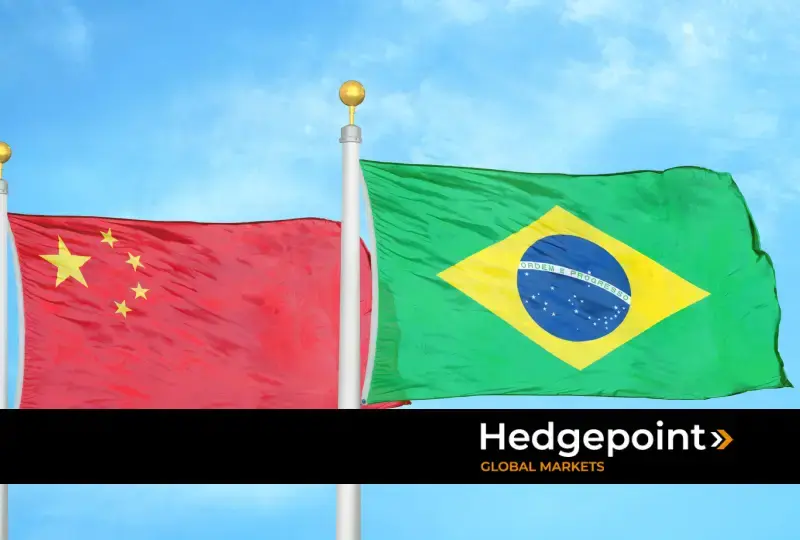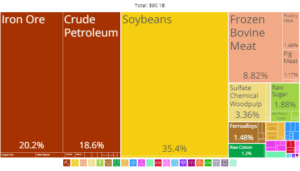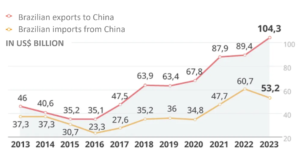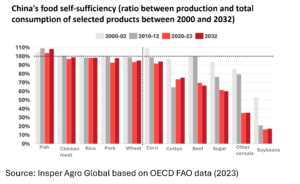
In 2024, trade and diplomatic ties between Brazil and China celebrated their 50th anniversary. This partnership aims to diversify sources of supply and str

In 2024, trade and diplomatic ties between Brazil and China celebrated their 50th anniversary. This partnership aims to diversify sources of supply and strengthen global food security.
The bilateral relationship between the countries has strengthened in recent years. In July 2024, Brazil increased exports to China by US$1.4 billion or 16.1%. To find out more about Brazil’s strategic role in this trade link and its impact on the world stage, read the full text on our blog.
The United States Department of Agriculture (USDA) reports that Brazil is the world’s largest exporter of soybeans. This amount is largely sent to China, which is the biggest importer of this grain.
According to data from the Observatory of Economic Complexity, Brazil’s main exports to China are iron ore, soybeans and oil. See below:

Soy production in Brazil has become a fundamental part of food security policies and has contributed to China’s development and social stability since the early 2000s. On the Chinese side, there is a sectoral policy that is part of a broader development strategy, while in Brazil there is a pragmatic response aimed at taking advantage of an opportunity that has opened up.
In 20 years, China has become the largest consumer of Brazilian agricultural products, surpassing the European Union and the USA combined. In 2022, its share of Brazilian agricultural exports reached 32%, compared to just 2.7% in 2000, an increase of more than six times. Meanwhile, the share of the United States and the European Union fell from 41% to 23%.
The Asian country imported 30.7% of Brazil’s exports in 2023. China also maintained its position as the main supplier of manufactured goods to Brazil, with 22.1% of imports. See the data published by the channel that reports on trade between the countries:

Sources: MDIC and AEB
Read also:
As the largest supplier of basic agricultural products to China, Brazil plays a key role in the country’s food supply, especially with China’s growing demand for agricultural products. Currently, the Asian nation has only 8% of the planet’s arable land, while its population represents 20% of all the world’s people.
With these figures, China has applied different policies to guarantee the country’s food security. A study by Insper Agro Global, called China: Food Security and Growing Demand for Food, reports on the main measures adopted:
However, the country has relaxed its rules on some specific products, such as soybeans imported from Brazil. China’s internal focus at the moment will be on the production of the most consumed grains, seeking support from other nations for the rest. See the graph published by Insper Agro Global showing which products the country is self-sufficient in and which it is not:

Today, the countries have forged a mutual relationship. Below, we can see the import and export data between these two nations and how much trade relations have grown in recent years:
Table 1. Mutual Dependence between China and Brazil in Agricultural Products
(Import and export values, in USD, for 2000 and 2023)
| Product | Exports Brazil → China+HK (USD million) | 2000 | 2023 | Growth (CAGR) | % per year |
| Soy Complex | 371 | 39,651 | 22% | 1st (74%) | 1st (68%) |
| Beef | 42 | 6,081 | 24% | 1st (55%) | 1st (40%) |
| Corn | 0.5* | 4,473 | 55%** | 1st (10%) | 1st (45%) |
| Pulp | 106 | 3,963 | 17% | 1st (38%) | 1st (20%) |
| Sugar | 0.1 | 1,910 | 56% | 1st (12%) | 1st (55%) |
| Chicken Meat | 75 | 1,707 | 15% | 1st (17%) | 1st (28%) |
| Cotton | 1.4 | 1,513 | 30% | 2nd (28%) | 2nd (28%) |
| Pork | 61 | 1,215 | 14% | 1st (44%) | 2nd (19%) |
| Total | 919 | 63,050 | 20% | 1st (38%) | 1st (18%) |
Source: Elaborated by Insper Agro Global based on data from SECEX (2024), UN Comtrade (2024), and TDM (2024).
Note: The agribusiness definition used is from MAPA.
Even with a lower birth rate, China is still seeing an increase in demand for food due to a reduction in labor in the countryside, a shortage of arable land and rapid economic growth.
For this reason, relations between Brazil and China are expected to continue to evolve. According to the Brazil-China Business Congress (CEBC), the Latin American country still has opportunities ahead of it. The institution listed 216 goods that could be used in Chinese exports, seeking to diversify products.
Check out the list of areas developed by the CEBC in which Brazil can maintain, expand or start new exports with China:
Source: Report “Exports from Brazilian States to China”
Read also:
New agreements have also strengthened the relationship between Brazil and China. The countries have discussed making financial transactions without the US dollar, as well as agreements to reduce costs and ease laws for Chinese companies to enter Brazilian borders. In 2022, for example, 32 new Chinese projects landed in Brazil. These are ventures in the energy, information technology, agriculture and other sectors.
As the two nations continue to develop trade strategies, it will be crucial to tackle emerging challenges and seize new opportunities to ensure a solid future for Sino-Brazilian relations. For now, China’s Food Self-Sufficiency Policy will still depend on Brazil’s exports, but the constant exchange between the two countries can still evolve.
Sign up to our blog newsletter to receive content like this, as well as other information on hedging, price risk protection and much more, directly to your inbox!
Subscribe now and follow the content prepared by professionals working in the market.

Rua Funchal, 418, 18º andar - Vila Olímpia São Paulo, SP, Brasil
Contato
(00) 99999-8888 example@mail.com
Section
Home
O que Fazemos
Mercado
Quem Somos
HUB
Blog
Esta página foi preparada pela Hedgepoint Schweiz AG e suas afiliadas (“Hedgepoint”) exclusivamente para fins informativos e instrutivos, sem o objetivo de estabelecer obrigações ou compromissos com terceiros, nem de promover uma oferta ou solicitação de oferta de venda ou compra de quaisquer valores mobiliários, commodity interests ou produtos de investimento.
A Hedgepoint e suas associadas renunciam expressamente a qualquer uso das informações contidas neste documento que direta ou indiretamente resulte em danos ou prejuízos de qualquer natureza. As informações são obtidas de fontes que acreditamos serem confiáveis, mas não garantimos a atualidade ou precisão dessas informações.
O trading de commodity interests, como futuros, opções e swaps, envolve um risco substancial de perda e pode não ser adequado para todos os investidores. Você deve considerar cuidadosamente se esse tipo de negociação é adequado para você, levando em conta sua situação financeira. O desempenho passado não é necessariamente indicativo de resultados futuros. Os clientes devem confiar em seu próprio julgamento independente e/ou consultores antes de realizar qualquer transação.
A Hedgepoint não fornece consultoria jurídica, tributária ou contábil, sendo de sua responsabilidade buscar essas orientações separadamente.
A Hedgepoint Schweiz AG está organizada, constituída e existente sob as leis da Suíça, é afiliada à ARIF, a Associação Romande des Intermédiaires Financiers, que é uma Organização de Autorregulação autorizada pela FINMA. A Hedgepoint Commodities LLC está organizada, constituída e existente sob as leis dos Estados Unidos, sendo autorizada e regulada pela Commodity Futures Trading Commission (CFTC) e é membro da National Futures Association (NFA), atuando como Introducing Broker e Commodity Trading Advisor. A Hedgepoint Global Markets Limited é regulada pela Dubai Financial Services Authority. O conteúdo é direcionado a Clientes Profissionais e não a Clientes de Varejo. A Hedgepoint Global Markets PTE. Ltd está organizada, constituída e existente sob as leis de Singapura, isenta de obter uma licença de serviços financeiros conforme o Segundo Anexo do Securities and Futures (Licensing and Conduct of Business) Act, pela Monetary Authority of Singapore (MAS). A Hedgepoint Global Markets DTVM Ltda. é autorizada e regulada no Brasil pelo Banco Central do Brasil (BCB) e pela Comissão de Valores Mobiliários (CVM). A Hedgepoint Serviços Ltda. está organizada, constituída e existente sob as leis do Brasil. A Hedgepoint Global Markets S.A. está organizada, constituída e existente sob as leis do Uruguai.
Em caso de dúvidas não resolvidas no primeiro contato com o atendimento ao cliente (client.services@hedgepointglobal.com), entre em contato com o canal de ouvidoria interna (ombudsman@hedgepointglobal.com – global ou ouvidoria@hedgepointglobal.com – apenas Brasil) ou ligue para 0800-8788408 (apenas Brasil).
Integridade, ética e transparência são valores que guiam nossa cultura. Para fortalecer ainda mais nossas práticas, a Hedgepoint possui um canal de denúncias para colaboradores e terceiros via e-mail ethicline@hedgepointglobal.com ou pelo formulário Ethic Line – Hedgepoint Global Markets.
Nota de segurança: Todos os contatos com clientes e parceiros são realizados exclusivamente por meio do nosso domínio @hedgepointglobal.com. Não aceite informações, boletos, extratos ou solicitações de outros domínios e preste atenção especial a variações em letras ou grafias, pois podem indicar uma situação fraudulenta.
“Hedgepoint” e o logotipo “Hedgepoint” são marcas de uso exclusivo da Hedgepoint e/ou de suas afiliadas. O uso ou reprodução é proibido, a menos que expressamente autorizado pela HedgePoint.
Além disso, o uso de outras marcas neste documento foi autorizado apenas para fins de identificação. Isso, portanto, não implica quaisquer direitos da HedgePoint sobre essas marcas ou implica endosso, associação ou aprovação pelos proprietários dessas marcas com a Hedgepoint ou suas afiliadas.
aA Hedgepoint Global Markets é correspondente cambial do Ebury Banco de Câmbio, de acordo com a resolução CMN Nº 4.935, DE 29 DE JULHO DE 2021, Artigo 14 do Banco Central do Brasil (BACEN).
Para mais informações sobre nosso parceiro, serviços disponíveis, atendimento e ouvidoria, acesse o link a seguir: https://br.ebury.com/